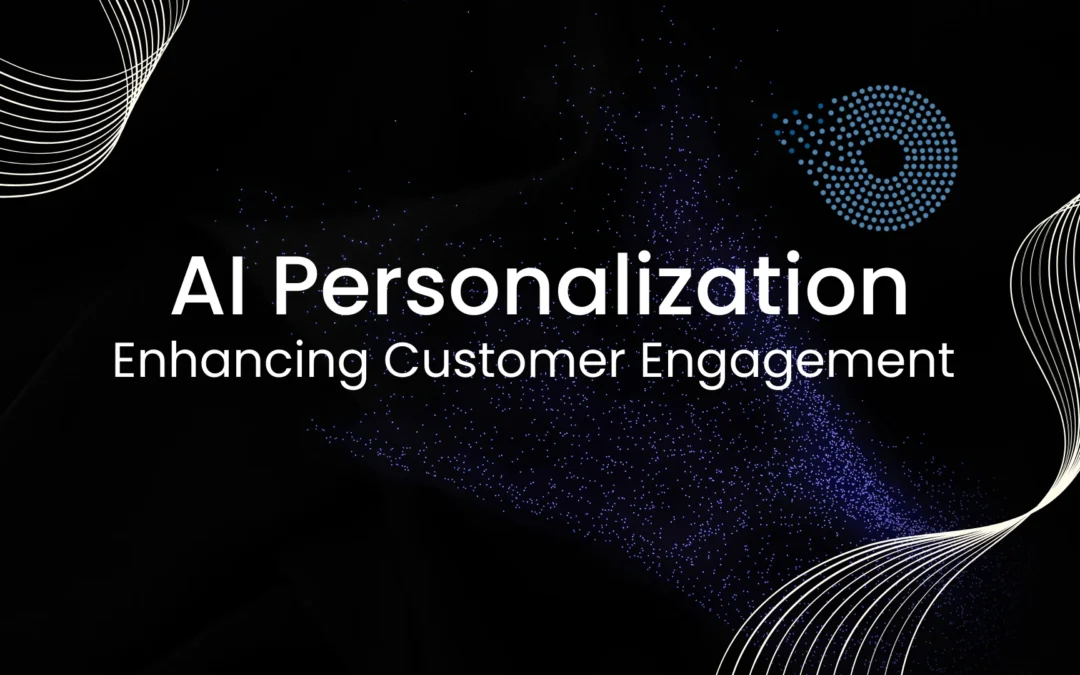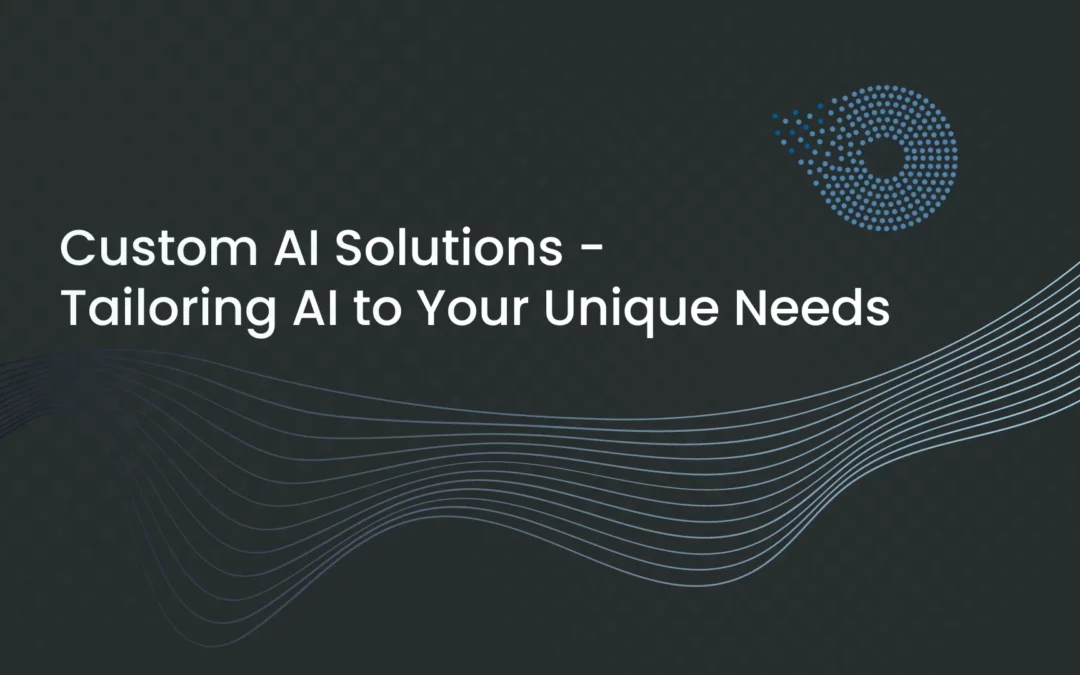[pac_divi_table_of_contents included_headings="on|on|on|off|off|off" minimum_number_of_headings="6" scroll_speed="8500ms" level_markers_1="decimal" level_markers_3="none" title_container_bg_color="#004274" _builder_version="4.22.2" _module_preset="default"...

AI Personalization Excellence: Enhancing Customer Engagement in 2024
AI Personalization Excellence: As a business owner, you understand that the client experience is essential. Satisfied clients recommend you to their friends, come back for more, and improve your revenue.
What is the best way to give each customer a customized experience? It is where artificial intelligence (AI) plays a role.
The development of AI-enhanced customer experiences has opened up a lot of new options for personalization. Businesses can use huge amounts of data and AI systems to learn valuable things and give their customers experiences that are highly targeted and relevant.
AI in customer engagement enables a more profound comprehension of your clients, tailors recommendations and promotions, and ultimately generates a sense of recognition and appreciation for each customer.
This article will examine how AI in customer engagement can enhance your customer experience and facilitate the development of a devoted client base.
The Importance of Customer Engagement Strategies with AI
Companies no longer believe that a universal message can attract or retain customers and instead recognize the importance of tailoring communications to each customer.
Consumer engagement refers to creating and nurturing a customer relationship, going beyond a basic transactional encounter. It entails building rapport, gaining trust, and satisfying clients at every point of contact.
Increased customer happiness, brand loyalty, and revenue can result from engaging with consumers. There are many upsides to fostering strong relationships with one’s customer base.
Customers who feel invested in a brand are more likely to make more purchases, become brand ambassadors, and recommend the brand to their friends.
Customers who are invested in a company’s success are likelier to make larger purchases on average. Furthermore, engaged customers contribute essential comments and insights to help firms improve their products, services, and overall customer experience.
Personalization in customer experience is crucial due to various factors. Here are a few examples:
1) Enhanced customer satisfaction
Tailored encounters foster a sense of appreciation and comprehension among customers.
2) Enhanced customer engagement and loyalty
By comprehending a customer’s preferences, you may provide customized content and messages that improve personalized customer interactions.
3) Enhanced revenue and sales
Utilizing personalization can optimize the relevance and swiftness of your marketing and sales endeavors, resulting in elevated conversion rates and average order values.
4) Cost reduction through enhanced efficiency
By implementing automation in certain aspects of the personalization process, you may optimize time and use resources more effectively, all while ensuring a superior client experience.
Several studies of AI in customer engagement for buyer persona have shown that:
- 80% of people are more likely to buy something from a brand that gives them a personalized experience.
- Personalization in marketing is very or somewhat appealing to 90% of people in the US.
- 63% of people will stop buying from companies that don’t do an excellent job of personalization
- 66% of customers say they wouldn’t buy something if they saw stuff that wasn’t personalized.
The following important parts should be in a personalization plan.
- The most important business goals and digital responsibilities
- Core skills needed to provide tailoring on a large scale. Look at the tech stack you already have.
- Best practices in the industry for four main types of personalization: data, content, decisions, and channel delivery.
- Use cases for AI that make repetitive jobs useful in the areas of.
|
Planning |
Coming up with smart plans. |
|
Productivity |
Making smart content. |
|
Personalization |
Making smart experiences for customers. |
|
Promotion |
Running smart cross-channel campaigns. |
|
Performance |
Turning information from data into knowledge. |
A personalization plan can help a business see the big picture of all the data and technology needed to make personalization work on a large scale.
How Generative AI-enhanced customer experiences?
Generative AI encompasses more than simple task automation. The objective is to create smart solutions that may familiarize clients with a brand’s commitment and guarantee its realization throughout their experience.
Companies can use generative AI to make relationships with customers much more personalized, accurately guess what customers will want, and give them timely, relevant solutions even before they know they need them.
This technology can connect a brand’s intention with a customer’s perception, guaranteeing that the promise made is not only fulfilled but beyond.
Embracing innovative technologies is not only a choice but a requirement for firms striving to maintain a competitive edge.
What are the Customer engagement strategies with AI?
Customer engagement strategies with AI can be a great way to improve interactions with customers, make things more personal, and help businesses grow. Here are some important forms to get people interested in AI:
#1. Customized Suggestions
AI programs can examine how customers act and what they like to give them. Personalized customer interactions for products or content. It makes the experience of the customer better, which leads to more sales and keeping customers.
#2. Analytics for Prediction
AI can guess what customers want, like when they need to reorder a product or get help with a problem. Businesses can get people more involved and better meet their needs by contacting them independently.
#3. NLP stands for “natural language processing.
Use NLP to understand and answer customer questions, even if they inquire in typical language. It helps make customer service feel more like talking to a natural person.
#4. With augmented reality and virtual try-on
Use AI-powered virtual try-ons for beauty and fashion items or augmented reality (AR) tools to help customers see how an item will look in their own space.
#5. Emotional analysis
Use mood analysis tools to monitor social media and customer reviews. It helps you figure out how your customers feel and deal with problems or trends immediately.
#6. Segmenting customers
Use AI to divide your customers into groups based on behavior, age, gender, and more. It lets you send marketing messages and deals made explicitly for certain groups.
#7. Engagement across all channels
Ensure the different contact channels work well so customers can switch between them without losing the conversation thread. AI can help make sure that exchanges are consistent.
#8 Making a customer journey map
Make detailed maps of the customer journey with AI to find touchpoints where AI can improve connections and ease pain points.
Case study
Netflix
Netflix lets consumers access movies and TV shows on demand. They feature a huge selection of classic and modern movies and series. These titles are accessible on TV, laptops, and smartphones.
Netflix’s AI-powered recommendation system is amazing. The recommendation system suggests shows and movies based on your viewing history. Your interactions improve this system’s accuracy.
Netflix pioneered original content. Their production house makes exclusive TV series and movies for customers. Netflix Originals like Stranger Things, Narcos, and The Crown are popular.
Netflix is great for watching movies and TV series without advertisements or scheduling. AI-powered recommendation engine and original content make it a popular streaming service.
Final Words on AI in Customer Engagement
Personalized customer interactions are now an important way to get customers’ attention and keep them returning in today’s competitive market. Personalizations driven by AI are a powerful way to give customers a unique experience that fits their needs and makes them more interested in your business. Businesses can gain a lot from using artificial intelligence (AI) to improve the customer experience, get customers more involved, and boost sales rates.
However, there are obstacles and moral questions to think about before putting AI-powered customization into action. It means making sure the data is correct and reducing bias. When marketers personalize things for customers, they must also ensure their privacy and safety come first.
Explore Tailored Custom AI Solutions for Your Unique Needs
Step into the future with Custom AI Solutions in 2024! Tailor-made for your success, it’s time to innovate and thrive!
View More
Recent Post
Accelerate Data Workflows: Optimize Omnichannel sales with Delta Cache and Skipping
What is Ad Hoc Analysis and Reporting?
[pac_divi_table_of_contents included_headings="on|on|on|off|off|off" minimum_number_of_headings="6" scroll_speed="8500ms" level_markers_1="decimal" level_markers_3="none" title_container_bg_color="#004274" _builder_version="4.22.2" _module_preset="default"...
Top Benefits of Data Governance for Your Organization
[pac_divi_table_of_contents included_headings="on|on|on|off|off|off" minimum_number_of_headings="6" scroll_speed="8500ms" level_markers_1="decimal" level_markers_3="none" title_container_bg_color="#004274" admin_label="Table Of Contents Maker"...






